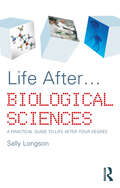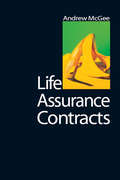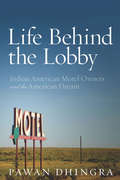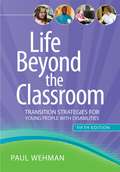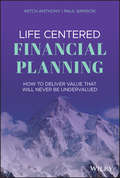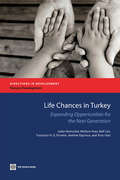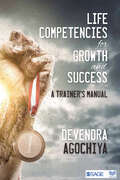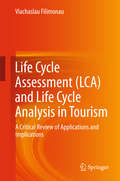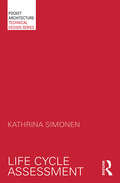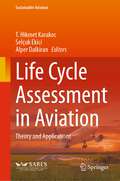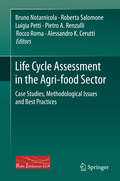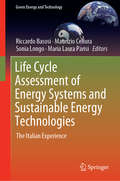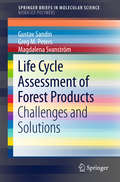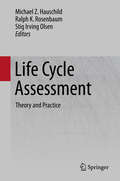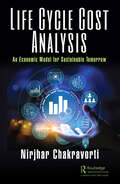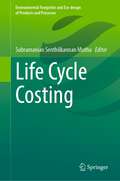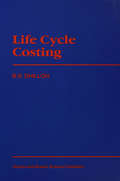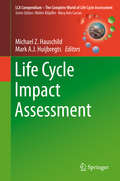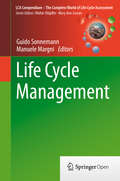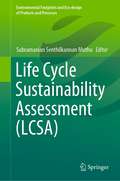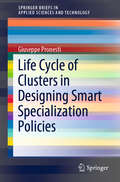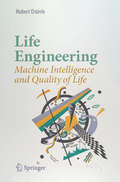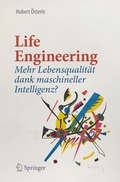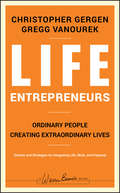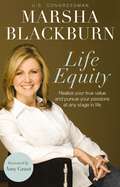- Table View
- List View
Life After...Biological Sciences: A Practical Guide to Life After Your Degree
by Sally LongsonThousands of students graduate from university each year. The lucky few have the rest of their lives mapped out in perfect detail – but for most, things are not nearly so simple. Armed with your hard-earned degree the possibilities and career paths lying before you are limitless, and the number of choices you suddenly have to make can seem bewildering. Life After Biological Sciences has been written specifically to help students currently studying, or who have recently graduated, make informed choices about their future. It will be a source of invaluable advice and wisdom to business graduates, covering such topics as: Identifying career paths that interest you Seeking out an opportunity that matches your skills and aspirations Staying motivated and pursuing your goals Networking and self-promotion Making the transition from scholar to worker The Life After University series of books are more than simple ‘career guides’. They are unique in taking a holistic approach to career advice - recognising the increasing view that, although a successful working life is vitally important, other factors can be just as essential to happiness and fulfilment. They are the indispensable handbooks for students considering their future direction.
Life Assurance Contracts
by Andrew McGeeLife assurance continues to be a topic of great practical significance, given the popularity of endowment mortgages and pensions, which contain an element of insurance, as well as the need for families to protect against the loss of their breadwinners. Since the first edition of this book in 1995 much has changed, with a fundamentally new regulatory structure under the Financial Services and Markets Act 2000, changes in divorce and bankruptcy law, as well as continued developments in areas such as insurable interest and utmost good faith. All these developments are covered in this new edition, which at the same time retains the extensive coverage of the well-established principles of this area of law. Areas dealt with include insurable interest, disclosure, cancellation, intermediaries, marketing, assignment, surrender and pension policies. This new edition has been comprehensively revised and updated to take account of changes since the last edition was published.
Life Behind the Lobby: Indian American Motel Owners and the American Dream
by Pawan DhingraIndian Americans own about half of all the motels in the United States. Even more remarkable, most of these motel owners come from the same region in India and-although they are not all related-seventy percent of them share the surname of Patel. Most of these motel owners arrived in the United States with few resources and, broadly speaking, they are self-employed, self-sufficient immigrants who have become successful-they live the American dream. However, framing this group as embodying the American dream has profound implications. It perpetuates the idea of American exceptionalism-that this nation creates opportunities for newcomers unattainable elsewhere-and also downplays the inequalities of race, gender, culture, and globalization immmigrants continue to face. Despite their dominance in the motel industry, Indian American moteliers are concentrated in lower- and mid-budget markets. Life Behind the Lobbyexplains Indian Americans' simultaneous accomplishments and marginalization and takes a close look at their own role in sustaining that duality.
Life Beyond the Classroom: Transition Strategies for Young People with Disabilities (Fifth Edition)
by Paul WehmanFor more than two decades, the trusted Life Beyond the Classroom text has shaped the practices of thousands of professionals helping students make a smooth transition from school to adulthood. Now this landmark textbook is in a NEW fifth edition—updated with the cutting-edge information professionals need in today's changing world, as young people with disabilities face unprecedented financial, family, employment, and educational challenges. A definitive compendium of up-to-date, evidence-based transition research, this expanded new edition takes Life Beyond the Classroom to the next level. Future professionals will get all the latest best practices and timely research on the full spectrum of transition topics, from assessment and assistive technology to social skills and self-determination. With this comprehensive revision of a pioneering text, the next generation of professionals will be fully prepared to give young people with disabilities appropriate, effective, and individualized support as they navigate our increasingly complex society. WHAT'S NEW: New chapters on critical topics: working with families multicultural transition planning teaching social skills secondary curriculum options
Life Centered Financial Planning: How to Deliver Value That Will Never Be Undervalued
by Mitch Anthony Paul ArmsonBring your financial planning to life by bringing life to your financial planning. Life-Centered Financial Planning: How to Deliver Value That Will Never Be Undervalued shows financial planners and advisors how to radically improve the service they provide to their clients by tying their decisions and strategies to their clients’ life events, stages, and goals. Written by distinguished financial professionals Mitch Anthony and Paul Armson, Life-Centered Financial Planning provides readers with practical advice and concrete strategies to revolutionize their organization and client service by: · Focusing on what matters most to clients, rather than maximizing assets under management or pushing products · Understanding that a strong financial plan means more than simply accumulating as much money as possible · Building a business model that is good for everyone involved: the financial advisor, clients, and the organization · Moving from being a commodity to being your client's trusted advisor The book is perfect for any financial planner or advisor who wishes to adapt to the radical redefinition of financial services taking place today.
Life Chances in Turkey: Expanding Opportunities for the Next Generation
by Francisco H. G. Ferreira Meltem Aran Arzu Uraz Jesko Hentschel Jérémie Gignoux Raif CanChildren in Turkey have vastly different odds of success. Their paths are affected by factors over which they have no control, such as how wealthy or educated their parents--and even grandparents--are. By investing in its children and youth, Turkey can create a virtuous cycle whereby these children and youth contribute more to their country's economic growth and social development, helping to realize its ambitious goals.
Life Competencies for Growth and Success: A Trainer’s Manual
by Devendra AgochiyaLIFE COMPETENCIES FOR GROWTH AND SUCCESS is a complete guide for trainers engaged in promoting life skills training and education. In today’s complex world, life competencies play a very important role in shaping the personality of individuals, in helping them establish their self-identity and in preparing them to face the myriad challenges of life more effectively. This will coalesce into producing more conscientious, responsible and productive members of society. This Trainer’s Manual can be used for training diverse groups of participants—those working with business firms or in the social development sector, young entrepreneurs, job aspirants, young executives looking for career-promoting and growth-oriented training opportunities, and technical or vocational trainees at different technical institutes under the skill-development programme of the Government of India. The Manual will also serve as a useful guide for self-improvement and self-training by all those who may not have access to formal training opportunities. The modular approach followed in the Manual will help trainers and training institutes in designing custom-made programmes for their groups.
Life Cycle Assessment (LCA) and Life Cycle Analysis in Tourism
by Viachaslau FilimonauTourism is an activity that anyone can take part in, regardless of their age, gender, nationality or level of income. This makes tourism one of the most rapidly developing industries in the world. Despite the number of benefits which tourism produces, it also has significant negative impacts on the environment. To minimise the scope of these negative impacts, joint efforts combining tourism and environmental management are called for. This book examines the application of the Life Cycle Assessment (LCA) method and lifecycle thinking as a tool to generate more accurate and holistic appraisals of the environmental impacts of tourism. Looking at the issue of sustainability of tourism operations, the book evaluates how it can be improved. It highlights the potential of LCA to affect tourist behaviour and contribute to tourism policy-making and managerial practice. This book provides a valuable resource for undergraduates, postgraduates and researchers interested in sustainable tourism, sustainable development and environmental impact assessment.
Life Cycle Assessment (PocketArchitecture)
by Kathrina SimonenLife Cycle Assessment addresses the dynamic and dialectic of building and ecology, presenting the key theories and techniques surrounding the use of life cycle assessment data and methods. Architects and construction professionals must assume greater responsibility in helping building owners to understand the implications of making material, manufacturing, and assemblage decisions and therefore design to accommodate more ecological building. Life Cycle Assessment is a guide for architects, engineers, and builders, presenting the principles and art of performing life cycle impact assessments of materials and whole buildings, including the need to define meaningful goals and objectives and critically evaluate analysis assumptions. As part of the PocketArchitecture Series, the book includes both fundamentals and advanced topics. The book is primarily focused on arming the design and construction professional with the tools necessary to make design decisions regarding life cycle, reuse, and sustainability. As such, the book is a practical text on the concepts and applications of life cycle techniques and environmental impact evaluation in architecture and is presented in language and depth appropriate for building industry professionals.
Life Cycle Assessment in Aviation: Theory and Applications (Sustainable Aviation)
by T. Hikmet Karakoc Alper Dalkiran Selçuk EkiciLife Cycle Assessment in Aviation: Theory and Applications provides readers with a comprehensive analysis that examines various elements within the aviation sector, including aircraft operations, maintenance and repair activities, aircraft gas turbine engine processes, airport auxiliary vehicles, airport operations, airport construction, airport access traffic, and airport wastes. The book’s content has been meticulously crafted to address the specific needs and interests of a diverse audience encompassing researchers, engineering students, and civil aviation organization officials. Readers will find valuable insights and up-to-date information about the latest developments in the aviation field, serving as a valuable resource for their investigations and studies.
Life Cycle Assessment in the Agri-food Sector
by Bruno Notarnicola Roberta Salomone Luigia Petti Pietro A. Renzulli Rocco Roma Alessandro K. CeruttiThe book presents an overview of the International practices and state-of-the-art of LCA studies in the agri-food sector, both in terms of adopted methodologies and application to particular products; the final purpose is to characterise and put order within the methodological issues connected to some important agri-food products (wine, olive oil, cereals and derived products, meat and fruit) and also defining practical guidelines for the implementation of LCAs in this particular sector. The first chapter entails an overview of the application of LCA to the food sector, the role of the different actors of the food supply chain and the methodological issues at a general level. The other chapters, each with a particular reference to the main foods of the five sectors under study, have a common structure which entails the review of LCA case studies of such agri-food products, the methodological issues, the ways with which they have been faced and the suggestion of practical guidelines.
Life Cycle Assessment of Energy Systems and Sustainable Energy Technologies: The Italian Experience (Green Energy and Technology)
by Riccardo Basosi Maurizio Cellura Sonia Longo Maria Laura ParisiThis book deals with the application of life cycle assessment (LCA) methodology to sustainable energy systems and technologies. It reviews the state-of-the-art of the Italian experiences on the LCA applied to energy, and the most recent results from research in this field, with a particular focus on renewables, bio-energy and sustainable solutions. The contributors describe in detail the applications of LCA to various energy system topics, including: • electricity production, smart energy grids and energy storage systems;• renewable energy production from biomass;• production of biodiesel from microalgae;• environmental impacts of biomass power plants; and• geothermal energy production. These topics are supported by critical reviews and case studies, with discussions of Italian examples, demonstrating LCA’s application to various energy systems. A particular focus is placed on bio-energies and bio-energy systems, demonstrating how LCA can be used for optimal bio-energy production. This book offers an opportunity for researchers and advanced practitioners in the field of LCA to learn more about the application of LCA methodology to energy systems and technologies. It will also be of interest to students, as it enables them to understand the environmental impacts of energy systems and sustainable energy technologies, through the analysis of their life cycles.
Life Cycle Assessment of Forest Products
by Gustav Sandin Greg M. Peters Magdalena SvanströmThis brief contains information on the reduction of environmental impact and explains how it is a key driver for the R&D of new forest products. The authors, experts in the field, describe how Life Cycle Assessment (LCA) is used to assess the environmental impact of such products, e. g. in order to guide R&D or attract investments. The authors describe the main challenges of carrying out LCAs on forest products, make recommendations for managing these challenges, and discuss future research needs. LCA case studies are used to illustrate the challenges, covering a variety of forest products: building components, biofuels, industrial chemicals, textile fibres and clothing. Described challenges include the planning of LCA studies (e. g. how can one use LCA in R&D?), the modelling of product systems (how can one handle multi-functionality and uncertainties related to waste handling and geographical location of future production?) and environmental impact (how can one assess water and land use impact, and the climate impact of biomass?).
Life Cycle Assessment: Theory And Practice (Lca Compendium - The Complete World Of Life Cycle Assessment Ser.)
by Michael Z. Hauschild Stig Irving Olsen Ralph K. RosenbaumThis book offers a detailed presentation of the principles and practice of life cycle impact assessment. As a volume of the LCA compendium, the book is structured according to the LCIA framework developed by the International Organisation for Standardisation (ISO)passing through the phases of definition or selection of impact categories, category indicators and characterisation models (Classification): calculation of category indicator results (Characterisation); calculating the magnitude of category indicator results relative to reference information (Normalisation); and converting indicator results of different impact categories by using numerical factors based on value-choices (Weighting). Chapter one offers a historical overview of the development of life cycle impact assessment and presents the boundary conditions and the general principles and constraints of characterisation modelling in LCA. The second chapter outlines the considerations underlying the selection of impact categories and the classification or assignment of inventory flows into these categories. Chapters three through thirteen exploreall the impact categories that are commonly included in LCIA, discussing the characteristics of each followed by a review of midpoint and endpoint characterisation methods, metrics, uncertainties and new developments, and a discussion of research needs. Chapter-length treatment is accorded to Climate Change; Stratospheric Ozone Depletion; Human Toxicity; Particulate Matter Formation; Photochemical Ozone Formation; Ecotoxicity; Acidification; Eutrophication; Land Use; Water Use; and Abiotic Resource Use. The final two chapters map out the optional LCIA steps of Normalisation and Weighting.
Life Cycle Cost Analysis: An Economic Model for Sustainable Tomorrow
by Nirjhar ChakravortiLife Cycle Costing (LCC) is the process of economic analysis to assess the total cost of ownership of an asset, including its cost of procurement, installation, operation, maintenance, conversion, and decommissioning. The economic approach to assess the total cost of owning an asset or facility is known as Life Cycle Cost Analysis (LCCA). LCCA is a key economic tool for business decision-making in terms of various functional requirements, such as sustainability, asset management, supply chain management, and project management. Every organization is a combination of various interrelated functions or departments. Every function has its own set of objectives and targets. Even though all functions try to achieve overall organizational objectives, in reality, they work to protect their functional interests as well. In many cases, it becomes detrimental to the health of the organization. This conflicting behavior increases when decisions are made on subjective considerations. When a company's strategy works on an objective platform, chances of conflict are reduced. LCCA can be used as a management decision tool for synchronizing functional conflicts by focusing on facts, money, and time. Life Cycle Cost Analysis: An Economic Model for Sustainable Tomorrow explains a simple, innovative model to carry out LCCA, along with a unique methodology to determine how the value of money changes over a period of time.
Life Cycle Costing (Environmental Footprints and Eco-design of Products and Processes)
by Subramanian Senthilkannan MuthuLife Cycle Costing (LCC) is a well-known and popular method to evaluate the economic sustainability, which as the term implies is structured on the life cycle of a product or process. LCC is a method primarily consisting of estimating the total cost of a product, taking into account the whole life cycle of the product as well as the direct and external costs. It is one of the important methods and tools under the sustainability umbrella. This book describes the concept of LCC and offers several interesting case studies.
Life Cycle Costing: Techniques, Models and Applications
by B. DhillonProduct acquisition involves an examination of the support cost of major equipment over its total life years. Depending on the type of equipment, support costs may range from 10 to 100 times the cost of acquisition. "Life Cycle Costing: Techniques, Models and Applications" offers a comprehensive approach to the entire field, and treats it in such a
Life Cycle Impact Assessment
by Michael Z. Hauschild Mark A. J. HuijbregtsThis book offers a detailed presentation of the principles and practice of life cycle impact assessment. As a volume of the LCA compendium, the book is structured according to the LCIA framework developed by the International Organisation for Standardisation (ISO)passing through the phases of definition or selection of impact categories, category indicators and characterisation models (Classification): calculation of category indicator results (Characterisation); calculating the magnitude of category indicator results relative to reference information (Normalisation); and converting indicator results of different impact categories by using numerical factors based on value-choices (Weighting). Chapter one offers a historical overview of the development of life cycle impact assessment and presents the boundary conditions and the general principles and constraints of characterisation modelling in LCA. The second chapter outlines the considerations underlying the selection of impact categories and the classification or assignment of inventory flows into these categories. Chapters three through thirteen exploreall the impact categories that are commonly included in LCIA, discussing the characteristics of each followed by a review of midpoint and endpoint characterisation methods, metrics, uncertainties and new developments, and a discussion of research needs. Chapter-length treatment is accorded to Climate Change; Stratospheric Ozone Depletion; Human Toxicity; Particulate Matter Formation; Photochemical Ozone Formation; Ecotoxicity; Acidification; Eutrophication; Land Use; Water Use; and Abiotic Resource Use. The final two chapters map out the optional LCIA steps of Normalisation and Weighting.
Life Cycle Management
by Guido Sonnemann Manuele MargniThis book provides insight into the Life Cycle Management (LCM) concept and the progress in its implementation. LCM is a management concept applied in industrial and service sectors to improve products and services, while enhancing the overall sustainability performance of business and its value chains. In this regard, LCM is an opportunity to differentiate through sustainability performance on the market place, working with all departments of a company such as research and development, procurement and marketing, and to enhance the collaboration with stakeholders along a company's value chain. LCM is used beyond short-term business success and aims at long-term achievements by minimizing environmental and socio-economic burden, while maximizing economic and social value.
Life Cycle Sustainability Assessment (Environmental Footprints and Eco-design of Products and Processes)
by Subramanian Senthilkannan MuthuEnvironmental Life Cycle Assessment (ELCA) that was developed about three decades ago demands a broadening of its scope to include lifecycle costing and social aspects of life cycle assessment as well, drawing on the three-pillar or ‘triple bottom line’ model of sustainability, which is the result of the development of the Life Cycle Sustainability Assessment (LCSA). LCSA refers to the evaluation of all environmental, social and economic negative impacts and benefits in decision-making processes towards more sustainable products throughout their life cycle. Combination of environmental and social life cycle assessments along with life cycle costing leads to life cycle sustainability assessment (LCSA). This book highlights various aspects of life cycle sustainability assessment (LCSA).
Life Cycle of Clusters in Designing Smart Specialization Policies (SpringerBriefs in Applied Sciences and Technology)
by Giuseppe PronestìThis book investigates cluster-life-cycle (CLC) analysis to inform the entrepreneurial discovery process (EDP), in order to support the effectiveness of the smart specialization strategy (S3). It focuses on the evolutionary analysis of clusters’ development stages (emergence, development, maturity, decline/transformation), highlighting how different phases of the CLC have a different role in informing S3-policy-making and identifying regions’ potentials to specialize. In so doing, it offers an original conceptual model that explains what information can be provided by CLC analysis in the effective design and implementation of S3 and EDP, systematizes clusters' stage-specific features, and unveils the role played by each CLC stage. It contributes to the emerging academic debate on the role of the CLC concept in policy-making, by highlighting the importance of CLC analysis in dynamically investigating regional contexts and tailoring development policies such as S3. The book is an invaluable resource for academics and regional policy makers, providing them with guidance and recommendations on how to effectively approach the design and implementation of S3 and EDP, by fully tapping the potential of CLC analysis.
Life Engineering: Machine Intelligence and Quality of Life
by Hubert OsterleMachine Intelligence is changing every aspect of our lives. Internet traffic and sensors in households, cars, and wearables provide data that oligopolistic companies collect and use to extract patterns of human behavior. Further, active digital assistants are taking over more and more of our everyday decisions. Humanity is on the verge of an evolutionary leap and it is time to determine if this development will benefit people’s wellbeing or will just mean the accumulation of capital and power with no regard for quality of life. This book integrates the perspectives of various disciplines that are striving to establish resilient foundations – computer science, economics and social sciences, political science, psychology, philosophy, neuroscience, ethics and religion – in order to clarify a number of positions and, as a result, objectify the discussions. Written by Hubert Osterle, a researcher working at the interface of these disciplines, the book promotes debate on the future of man and machine, on happiness and evolution and on the major changes brought about by digital technology. Last but not least, it is a manifesto calling for a new – integrated – discipline to be founded: life engineering.
Life Engineering: Mehr Lebensqualität dank maschineller Intelligenz?
by Hubert ÖsterleMaschinelle Intelligenz verändert unser Leben. Der Datenverkehr im Internet, digitale Assistenten sowie Sensoren in Haushalten, Autos und Wearables liefern Daten, die von Unternehmen gesammelt und genutzt werden, um Muster des menschlichen Verhaltens zu extrahieren. Es ist an der Zeit, zu entscheiden, ob diese Entwicklung dem Wohle der Menschen zugutekommt oder nur zur Ansammlung von Kapital und Macht ohne Rücksicht auf die menschliche Lebensqualität führt.Dieses Buch integriert die Perspektiven verschiedener Disziplinen – Informatik, Wirtschafts- und Sozialwissenschaften, Politikwissenschaft, Psychologie, Philosophie, Neurowissenschaften, Ethik und Religion. Hubert Österle fördert damit die Debatte über die Zukunft von Mensch und Maschine, über Glück und Evolution sowie über die großen Veränderungen, die die digitale Technologie mit sich bringt. Das Buch ist ein Manifest, das zur Gründung einer neuen –integrierten – Disziplin aufruft: Life Engineering.Der InhaltLeben mit maschineller IntelligenzLebensassistenz im Jahre 2030Maschinelle Intelligenz im Jahre 2030LebensqualitätEvolution mit LebensqualitätKonsequenzen für Individuen, Unternehmen und GesellschaftDisziplin Life EngineeringAgenda für das Life EngineeringStimmen zum BuchDie maschinelle Intelligenz ist eine Herausforderung für Menschen, Unternehmen und Politik. Das Buch liefert eine gründliche Analyse der technologischen Trends und ihrer Chancen und Gefahren für die Lebensqualität. Ausgehend von der Maxime des Glücks des Homo Digitalis formuliert Österle teilweise außerordentlich provokative Fragen wie etwa nach dem Wert der Privatheit. Gerade derartige Fragen und die vom Mainstream abweichenden Antworten auf Basis nachvollziehbarer Überlegungen machen es zur Pflichtlektüre.Thomas Hess, Professor und Direktor des Instituts für Wirtschaftsinformatik und neue Medien der Ludwig-Maximilians-Universität München und Sprecher des Internet Business ClustersDieses Buch ist eine äußerst realistische Aufarbeitung technologischer Trends und ihrer Konsequenzen für die Lebensqualität der Menschen. Die aufgeworfenen Fragen und die Versuche rationaler Antworten widersprechen vielen der heute breit akzeptierten Ansichten, insbesondere zur Autonomie des Menschen. Ob man zustimmt oder nicht, den Herausforderungen für das Individuum, die Unternehmen, die Politik und die Zivilgesellschaft müssen wir uns stellen.Henning Kagermann, ehemaliger CEO der SAP AG sowie Vorsitzender der Nationalen Plattform Elektromobilität, des Arbeitskreises Industrie 4.0 und des Fachforums Autonome Systeme
Life Entrepreneurs
by Christopher Gergen Gregg Vanourek"An inspirational and practical guide for anyone who wants to incorporate the dynamic skills of entrepreneurs into their own lives and work.A new generation of "life entrepreneurs" is emerging: people who apply their vision, talents, creativity, and energy not only to their work but to their entire lives, changing the world for themselves and those around them. In this book, successful entrepreneurs Christopher Gergen and Gregg Vanourek draw on numerous interviews with fifty-five leading entrepreneurs worldwide as well as the wisdom of multiple thought leaders to provide vivid examples, moving vignettes, concrete frameworks, and practical strategies for revving up our work and play through entrepreneurial leadership. This book starts by providing strategies for integrating life, work, and purpose and ends by capturing the implications of the current entrepreneurial boom for our workplaces, learning institutions, communities, and families.Christopher Gergen (Washington, D.C.) is a founding partner of New Mountain Ventures, co-founder and chairman of SMARTHINKING, Adjunct Professor and Director of the Entrepreneurial Leadership Initiative at Duke University, and a life-long entrepreneur,Gregg Vanourek (Thornton, CO) is a founding partner of New Mountain Ventures, former CEO of Vanourek Consulting Solutions, and former Senior Vice President of School Development for K12 Inc."
Life Equity: Realize Your True Value and Pursue Your Passions at Any Stage in Life
by Marsha BlackburnThe life you've led has prepared you for the life you dream of.For too long and for too many, the word leadership has had a masculine ring to it. Because women are such natural team players and consensus builders, many may simply view a strong desire to lead as, well, a bit rude. What we've failed to realize is if you define leadership as the art of getting a group of people working together effectively toward a common goal?then women bring some mighty powerful leadership skills to the table. So why don't we jump in?We long to dive into the challenges and make a difference, but holding us back are questions and self doubt:Do I have anything left to offer after my kids are grown?What if I fall on my face?Will anyone recognize what I have to offer?Do I have what it takes to make a real difference?How do I break into, or get around, the good ol' boy network?Whether you're a new college graduate, an empty nester, a divorceé starting life on your own (again), or a discontented cubical worker, Congressman Marsha Blackburn says you are an amazing, talented woman:Here is exciting news: there is a key truth that will unlock extraordinary possibilities for you. The simple but powerful truth is that your accumulated skills go with you. The ordinary, everyday tasks you have been performing are actually the foundation for getting you where you want to go. In even the most unglamorous roles, you have built real leadership ability that has prepared you for bigger things. Today, more than ever, the world needs leaders for jobs big and small, and women have been training for these tasks their whole lives. They can make a difference in their own lives and in our culture?and you can too.
